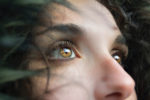Winter has arrived and the weather seems to be getting worse by the day. The extreme cold, combined with the wind, snow, and rain, can put a strain on your eyes. This can be especially difficult if you wear contact lenses. Lens wearers often worry that their eyes won’t tolerate them during the cold months.
In general, cold weather conditions are favorable for contact lens wear. However, as the humidity decreases, the eyes may become drier. Find out everything you need to know about wearing contact lenses in winter here.
Remember to stay hydrated
First and foremost, keep your water consumption high. We tend to drink less water in winter, which leads to dehydration of the body. The dryness of the eyes is also affected. It is therefore necessary to make a concentrated effort to increase your water intake throughout the day.
Use eye drops
Dry eyes can cause the tearing reflex, a phenomenon where anything that irritates the eye causes it to water. It is recommended that you use artificial tears or contact lens eye drops to keep your eyes moist. Moisturizing your eye will remove the unpleasant sensation without having to remove the lens.
Eye drops such as Biotrue Artificial Tears, Blink Intensive Tears Plus, Blink Contacts, Comfort Drops, Evo Tears are very effective: they moisten and refresh dry and irritated eyes. As a result, you can wear your contact lenses longer without experiencing dry eyes.
Reduce excessive use of contact lenses
To minimize temperature problems, avoid wearing contact lenses all the time and opt for your glasses whenever possible. This reduces the discomfort of eye irritation caused by excessive contact lens wear in winter. It is also relaxing for your eyes to switch to glasses a few hours before bedtime.
Change your contact lenses regularly
Don’t forget to renew your contact lenses according to the schedule established with your ophthalmologist, especially in winter. It is necessary to change your lenses, whether daily, bi-weekly or monthly, as this will allow them to conduct oxygen better, reduce eye irritation and increase comfort.
Install humidifiers
Central heating and fireplaces can often make the situation worse as they dry out the air in the house. Using humidifiers adds moisture to the room and prevents your eyes and skin from drying out.
Protect your eyes from UV rays
When planning your ski vacation or going for a walk in the mountains, ask your optometrist about the benefits of wearing daily disposable contact lenses. Lenses can improve visual clarity, peripheral vision and depth perception. Some models are also equipped with UV filters for additional protection. Keep your sunglasses on if you wear contacts and play winter sports, as they not only protect your eyes from the sun’s glare on the snow, but also from the wind and keep your contacts from drying out.
Select an appropriate contact lens type
A contact lens designed for dry eyes may be a good option to wear during the winter season. Daily disposable lenses may also be an appropriate choice to wear during your winter vacation. You can also choose a silicone hydrogel lens; this type of lens does not allow water to evaporate as easily as other models.
Each person’s eyes and needs are unique. We recommend that you contact your ophthalmologist for a personalized recommendation.
To learn more, contact our expert opticians at Lindegger Optique in Geneva.
Visit our online store to discover a wide range of contact lenses, care products and many other products for a better vision!





